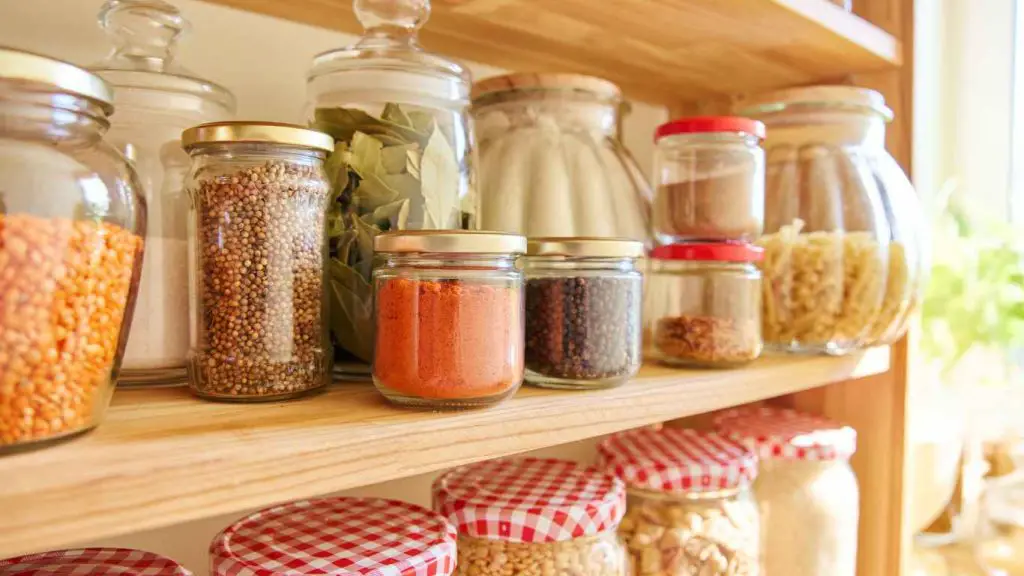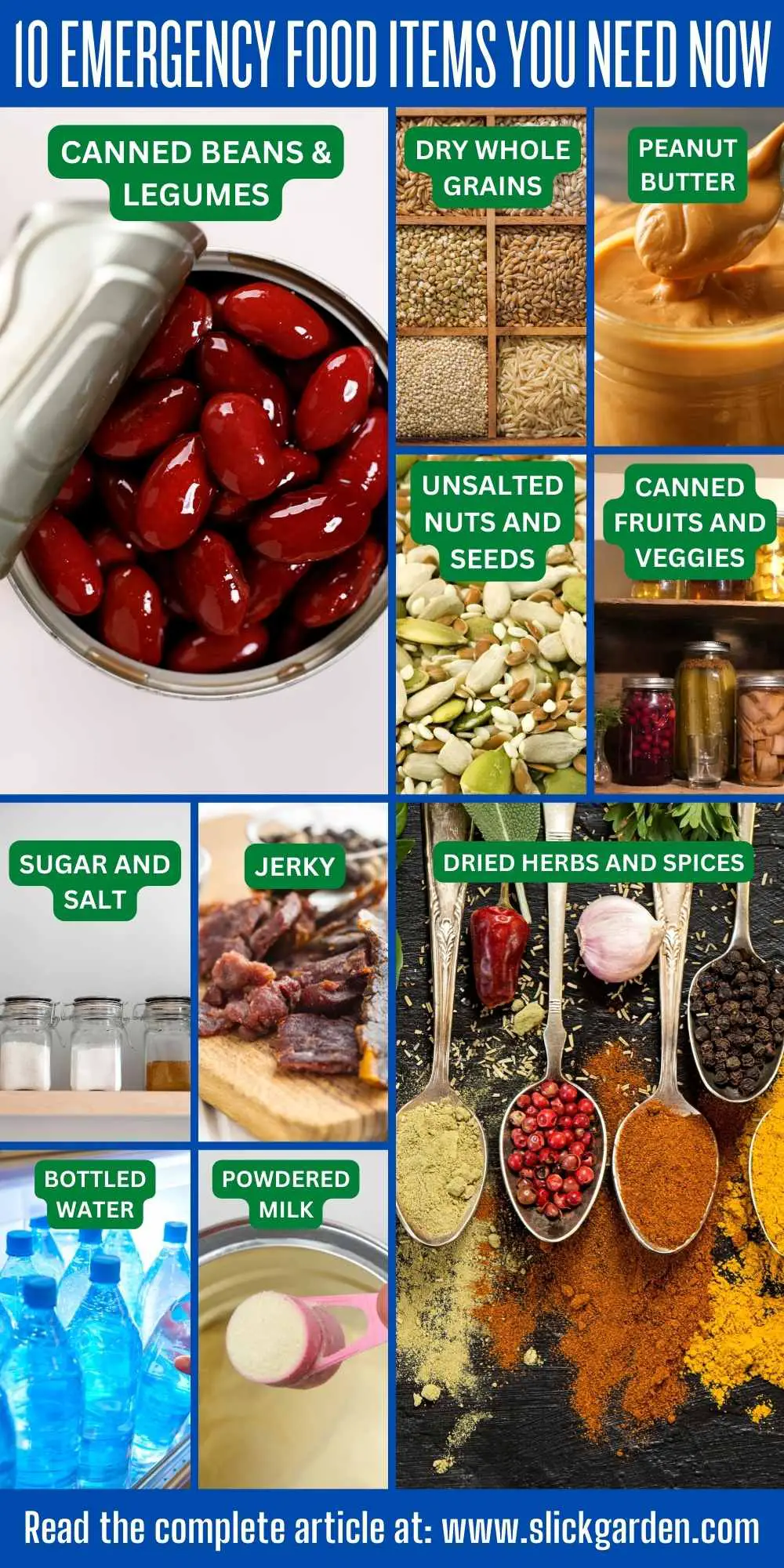You need food for your survival especially at the time of disaster because the demand for food increases at that time. The human body needs 2000 to 2400 calories per day.

Your life has unpredictable events such as power outages, lack of transportation, severe weather, social distancing, and natural disasters. These calamities are a part of our life.
For facing such problems we should stock your pantry with emergency food items.
WHAT IS EMERGENCY FOOD?
A disaster can occur without any warning in this world. You must have stored food for facing an emergency so you will not be cut off from food sources.
There should be all the emergency food items in your pantry that may or may not need cooking or refrigeration. If you have a home kitchen garden then it is also part of emergency food.
This homegrown food can be used in a financial crisis. This is a cheap way of feeding your family without spending much money.
WHY IS EMERGENCY FOOD IMPORTANT?
There is no fixed time for a calamity such as floods, hurricanes, and other disasters can occur at any time. Whenever any disaster strikes you should have enough food for yourself and your family.
Your emergency food kit will provide you with food when you can’t access any grocery stores. In such circumstances, you will stay calm and handle this situation with a low-stress level.
As you know food is very essential for your survival and access to essential food makes you content. This will maintain financial stability during an emergency.
This will also save you money because panic buying mode increases the prices of different communities. If you have stored food items then you can spend your money buying other essential things.
How Can I Get Started Preparing An Emergency Food Supply?
Before collecting all the emergency food items you must carefully examine the geography of your location. In case you are living in a tornado alley then you must have a basement room for storing different food items that have a long shelf life.
If you live in an area prone to flooding then you must store food items in the attic. In an emergency of floods, your family can be stuck on the roof. If you store your food in an attic then it will be within reach.
The second thing is you should consider the needs of you and your family. If you have an infant then you must keep special food and medication.
All the food items you will keep for emergencies must be according to the requirements of all the family members. You should consider their likes and dislikes. You should be careful about the aged members of your family.
For storing your emergency food items you must have airtight food containers to keep your food safe from pests, humidity, and light. These factors are not good for storing food items and can become the reason for damage.
Regular inspection is very important if you suspect any sign of damage, take immediate action. It is recommended that the storage place must be dry, cool, and dark for storing your emergency food items.
10 Emergency Food Items

It is not hard to create an emergency supply kit of food items. The food items you include in your pantry for emergencies must be nutritious. You should not try new food items for emergencies because they can upset your stomach.
The nutritional value of the food is very important for you. You should not compromise your health and select emergency food items that are a good source of fiber and nutrients. You should focus on the basic needs of your body rather than flavour.
1- CANNED BEANS AND OTHER LEGUMES
Beans and lentils are nutritious foods that contain fiber and protein. They are the primary part of a vegan and vegetarian diet.
If you want low-sodium canned beans then you purchase them with no added salt. Canned beans are a food item ready to eat so you must store them to face any emergency or calamity.
2- DRY WHOLE GRAINS
You must select food items that are very nutritious so you will get full energy in a state of emergency. Grains that must be added to your diet will help to reduce the risk of diabetes, obesity, heart diseases, and gastrointestinal disorders.
If you follow all the instructions for storing grains then it will extend their shelf life. You can easily purchase grains in bulk because they are available at cheaper prices.
It means storing them for an emergency can be beneficial for you. If a natural disaster strikes then you will be prepared for your survival. If you want to extend the life of grains then you must store them in mylar bags with an oxygen absorber.
Before sealing the bag you must push out all excess air from it. You must limit the air around the grains so it will help to extend the life of your stored food.
3- PEANUT BUTTER
The next food item that is included in our list is peanut butter which is packed with nutrients that are good for your body. Peanut butter contains low moisture and high oil that extend its shelf life.
This food item must be part of your emergency kit. Creamy, natural, crunchy, and super crunchy are different varieties of peanut butter. This emergency food item is rich in folate which must be part of the diet of pregnant women.
4- UNSALTED NUTS AND SEEDS
If you are looking for emergency food items that are rich in fiber, calorie-dense staples, and contain high protein and healthy fats then nuts and seeds should be added to your emergency pantry.
If nuts and seeds are exposed to light, heat, and oxygen then they will turn bitter and harsh. You should not eat such rancid seeds and nuts because it is very dangerous for your health. It can cause stomach pain and irritation that is not good for your body.
Make sure you are buying fresh nuts and seeds for storing and using airtight containers and jars. Always store raw nuts and seeds because when they are toasted or ground into flour then they start releasing oils and rancid more quickly.
Place your containers or jar in a cool, dark spot in your pantry. They will remain fresh for a few months at room temperature. If you want to store them for a long time then you can store the containers in a freezer or refrigerator.
The fluctuation of temperature will not become a problem for seeds and nuts in a freezer or refrigerator. You can keep them fresh for 6 months in the refrigerator. In a freezer, their shelf life will be more than one year.
Related Articles:
- 20 Best Vegetables To Grow In Buckets
- 8 Fast Growing Vegetables That You Can Grow In A Hurry
- How To Start Raised Bed Vegetable Gardening For Beginners?
5- CANNED FRUITS AND VEGGIES
Fruits and veggies are part of our diet. If you want to store them then canned veggies and fruits are the best options. It is a very easy way to eat straight out of the can.
You can store canned fruit and Vegetables for up to 5 years. Frozen fruit and veggies will lose nutritional value but some nutrients are also available for your body in emergencies.
6- SUGAR AND SALT
Sugar and salt are those substances that are commonly used. Pure salt is a mineral and can be stored for a long time. It is better to use pure salt without additives for storage.
To extend the shelf life of salt you must use airtight containers and place them in cool dark locations. You can also buy salt in bulk. There are different varieties of salt available such as table salt, iodized salt, real salt, and pink Himalayan salt. You can store any variety according to your personal preferences.
For long-term storage, you should protect sugar from contamination and moisture. You must use airtight food-grade containers to store the sugar. You must avoid using paper bags as they will deteriorate with time. Honey and corn syrup are sugar substitutes. You can also store them.
7- JERKY
This nutrient food must be added to your pantry. Dehydration is the process that is used for food preservation. This is a high-protein snack that gives your body energy.
You can store jerky for up to 3 months in an airtight container, mylar bag, or mason jar. For long-term storage, you need vacuum bags with oxygen absorbers. You can keep these vacuum bags in the refrigerator. A high moisture environment encourages the growth of mold.
8- BOTTLED WATER
If you want to maintain your body health then you need an adequate amount of water intake regularly. In case of any crisis, the local supply of water will be stopped or may not be available.
You should keep a couple of gallons of spring water in your basement or pantry so you can use it when you need it. You can also buy bottled water.
For storing water you should not use glass containers because they may break. You should also avoid using containers that have milk or fruit juice.
Because fruit sugars and milk proteins cannot be adequately removed from the containers and encourage the growth of bacteria. Before storing your water, you should wash the container with good dish soap and water.
9- DRIED HERBS AND SPICES
Spices and herbs enhance the flavor of your dishes. they should be part of your stored items. You must add herbs to your food because they contain antioxidants that make your food more healthy.
There is a difference between spices and Herbs. Herbs come from non-leafy parts of the plants like for example such as cinnamon bark, ginger, and all spices.
Usually, spices are dried and ground and can be stored for a long time. On the other hand, an herb is the leafy part of a green plant such as oregano, mint, coriander, rosemary, parsley, thyme, and basil.
You must make a list of your favorite spices and herbs for storing. After purchasing them. keep them in airtight containers and locate them in a dark cool and dry place.
Label each container so you can easily monitor them. Airtight containers help to prevent the evaporation of oils and aromas. It is suggested that you must use glass containers rather than using plastic.
Glass containers are better than plastic as plastic allows air to pass through that is not good for storing spices and herbs for a long time.
10- POWDERED MILK
Dehydrated and powdered food should be added to your pantries because you can easily store them for a long time. When moisture is removed from the milk then it turns into dry form.
It can be included in your emergency food items. Milk is a good source of vitamins A and D, calcium, and protein. You can create powdered milk by the drum drying process.
If you provide favourable conditions then dry milk can be stored for years. The suitable temperature for storing should be ranging from 55 to 70 degrees Fahrenheit.
Inconsistency in the temperature can cause negative effects on your food items. It is better to place powdered milk in a cool and dry place.
Related Articles:
